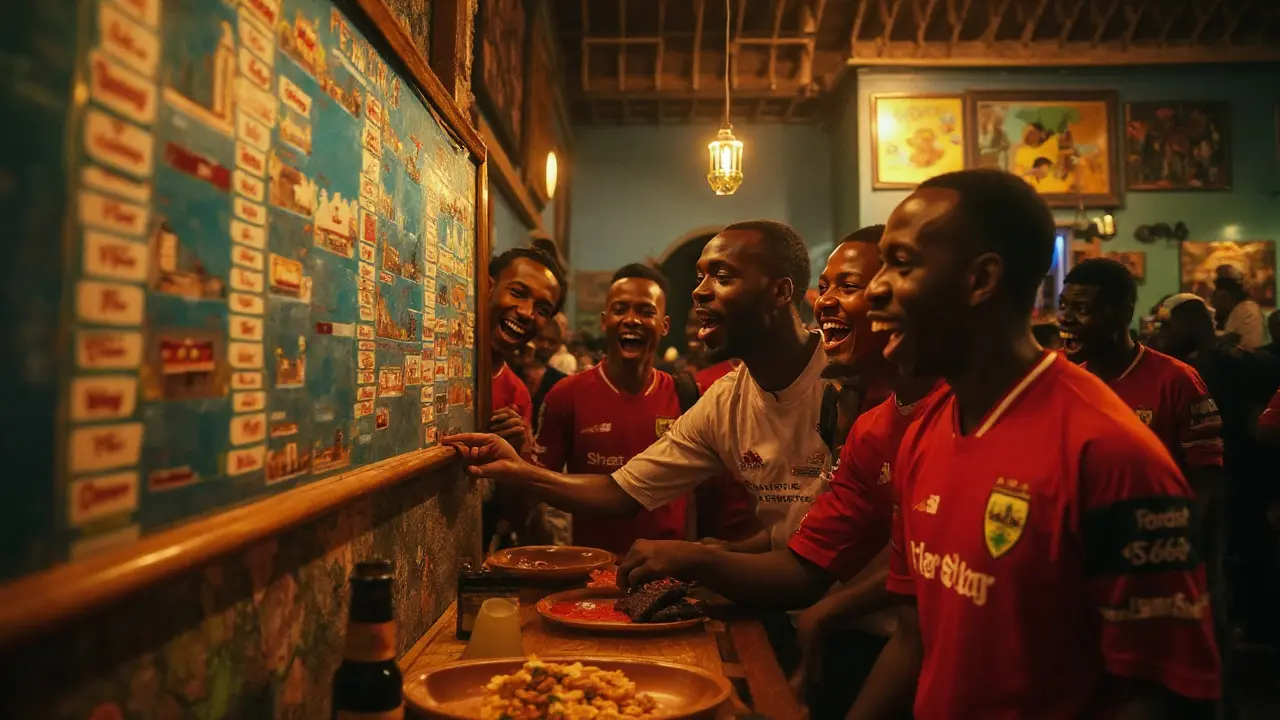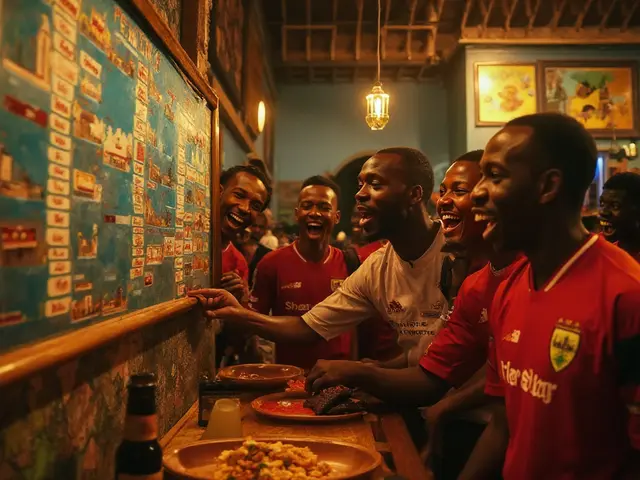6
How Betway Premiership Fixtures Have Changed: A Deep Dive into Their Evolution

Back in the early 2000s, you didn’t need an app to follow Betway Premiership fixtures. All it took was a small, rumpled page torn from the back of the Sunday paper, posted to the fridge with a magnet. Ask anyone who’s followed South African football for a while, they'll remember arguing over kickoff times in taxi queues and always knowing a cousin with the latest scoop. These days, it’s all digital, flashy, and much more complicated, but the noise and passion around fixtures remain unchanged—maybe even louder. The journey from those scrappy beginnings to today’s sleek, app-powered football calendar is one wild ride. And trust me, there are more twists in this story than most last-minute goals.
Simpler Days: When Fixtures Were Fixed but Not Set in Stone
The early years of Betway Premiership fixtures had a certain charm—if you consider chaos charming. Official announcements would promise the dates and venues well before the season, and fans clung to these printed promises, highlighting “big” matches and plotting noisy Saturdays. Except, life (and football politics) often got in the way. Some matches would mysteriously move, often “rescheduled due to unforeseen circumstances”—code for anything from transport problems to player strikes. Meanwhile, coaches, players, and all of us planning our weekends just had to go with the flow.
Teams like Kaizer Chiefs and Orlando Pirates drew crowds so big that sometimes kick-off times shifted just to squeeze more people in. Stories of last-minute venue switches, thanks to unexpected pitch invasions or local elections, are legendary. I remember one season, Derrick and I showed up at a stadium in full gold-and-black, only to find the game had moved fourteen blocks away—no Uber in those days, just mad legs and luck.
Fixture lists were more like wish lists. TV slots were rare, so you’d grab a cheap radio, huddle in a shebeen or on a friend's porch, and hope the match went ahead as planned. The concept of "fixture congestion"—too many games in too few days—existed, but I don't recall anyone complaining. Players and fans prided themselves on stamina. The focus was always the next 90 minutes, rarely the grand calendar. Now, every shift seems to spark a social media storm.
But let’s not fool ourselves—these fixtures mattered, maybe even more than now. The whole township would gather for a big derby, especially when the word was out days in advance. A missed match meant missing half the stories you’d trade at work or over Sunday stew. Summer breaks brought friendly debates on who had the toughest stretch of matches. Honestly, even if the fixture list looked “set,” every gathering was a lottery.
For all the hiccups, there was magic in the messiness. Following the fixtures took real effort, but the anticipation was half the fun. You learned the value of keeping ear to the ground, and families were glued together on game days, come rain or riot. It wasn’t organized or universal, but it felt like home.

Tech Takeover: When Data and Devices Rewrote Everything
Fast forward to the last decade, and it’s impossible to miss the impact of smartphones, social feeds, and streaming. Now, Betway Premiership fixtures practically yell for your attention—pushing notifications on your lock screen, updating in real time. The PSL’s fixtures page runs smoother than many online stores. If a game changes, you hear about it long before your neighbor knocks. It sounds perfect, but this digital order comes with its own quirks.
First, the season layout looks different. Scattered midweek matches pop up to fit TV deals and sponsors’ needs, especially as sports betting exploded in popularity. Night games feel almost normal. There was a time when floodlights made a match feel special; now, it’s just another Wednesday. Coaches groan about player fatigue as three matches cram into eight days, all to keep broadcasters happy and online audiences engaged.
Fans act as stats-keepers and schedule hawks. Social media’s turned everyone into an instant critic—if fixtures “favor” one team over another, it’s tweeted, posted, and dissected. Algorithms balance travel distance, club requests, and fairness. Last season, it took a computer system days to line up the matches for just one round, trying to avoid long-haul trips and unplayable stadiums.
One wild fact: a 2021 study by the University of Pretoria found fixture changes were happening at nearly double the rate compared to fifteen years before. Why? Weather, global broadcasting, and—big surprise—COVID knock-on effects. Teams sometimes play two matches in one week, travel cross-country, and do it all again within three days. The fixture planners use software that crunches thousands of data points, yet fans still bemoan “unfair clusters” for their favorite sides.
Streaming games changed habits too. People plan their lives around televised clashes. It’s common to see South Africans at work, headphones in, sneaking glimpses of a match during lunch. My friend lives in Joburg, but because of streaming, she's got more to say about Cape Town City than some locals. Accessibility jumped, but so did the sense of information overload. You never just check one source—now it’s PSL apps, social media rumors, and WhatsApp groups.
And the influence of betting can’t be ignored. Companies like Betway shape fixture timing with their marketing muscle. Prime-time matches are no accident. They generate bigger bets, which in turn generate bigger ad deals. Fans sometimes complain, but no one’s turning down the thrill of a packed evening match or a Sunday showdown with everything on the line.

Today’s Fixtures: A Balancing Act of Drama, Data, and Disruption
The current reality is that Betway Premiership fixtures are equal parts science project and soap opera. Calendar releases are events, picked apart on talk radio and Facebook groups. Every fan wants a fair draw, no "cursed" runs of away games, and a chance to see their side under the lights in their home city. But perfect balance is a fantasy, and surprise twists are part of the deal.
Now, key derbies are spaced for maximum exposure, not just to suit old rivalries. Last year, the Soweto derby was leapfrogged to a mid-March Sunday evening—drawing TV audiences six times higher than the average Saturday clash. That’s way more eyes on the game, but it’s also a different vibe from the raucous, sweaty afternoons of ten years ago. Some old-school fans mourn the changes, while younger supporters rave about how accessible and global everything feels. Honestly, I see both sides—I love the drama no matter what.
Fixture fairness gets debated more than player performance these days. If Mamelodi Sundowns pulls three games in six days, social media flares up. In truth, computers dictate much of it now. The PSL works with scheduling teams who look at international breaks, stadium availability, and predicted TV audiences. Bugs in code have delayed releases—there was a notorious case in 2023 when supporters crashed the league’s website refreshing for updates. Even my partner Derrick almost missed a birthday dinner staring at his phone (he says it was for work).
Disruptions are still part of the game but in new flavors. Heavy rains washed out two major fixtures last year, and security scares forced late venue swaps. Technology’s great, but it can’t beat Mother Nature or basic logistics. Fixture congestion also means more chances to discover rising stars. When starters get benched for back-to-back games, unsung players like Cassius Mailula get their shot—and sometimes end up legends by accident.
Fans have more options to react, with social feeds awash in memes and hot takes. In some ways, you’re not just watching sport—you’re watching a show, glued to every fixture twist. It pays to stay nimble: follow official channels, double-check kickoff times, and keep notifications on for last-minute changes. If you’re playing any fantasy team or putting bets down, that extra attention isn’t just fun, it’s essential.
For anyone planning to jump back into the stadiums—or even to keep their mobile betting slips up to date—here’s the best advice: stay flexible, check PSL and Betway updates often, and never trust a single source. Fixture lists are still living, breathing things. No matter how advanced the tech gets, the thrill of seeing your team walk out onto the pitch—on the right day, at the right stadium—is unbeatable. So lean into the ride. The Betway Premiership fixtures story is wild, imperfect, and exactly what keeps South African football hearts beating.







